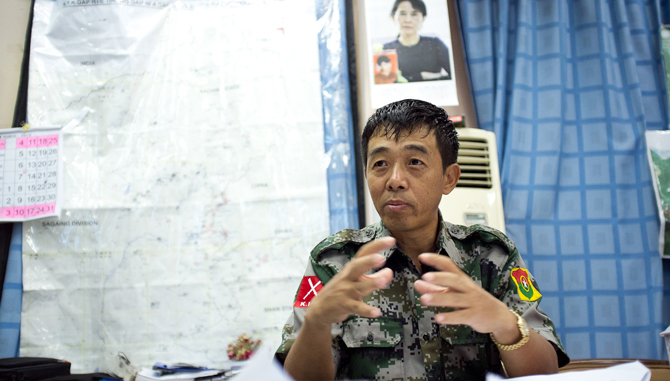Exclusive Interview with KIA Vice-Chief of Staff

Gen Gun Maw, the vice-chief of staff of the Kachin Independence Army, talks exclusively with The Irrawaddy at his command center in Laiza. Behind the general hangs a picture of Aung San Suu Kyi while a projector streams video from the talks in Ruili and a banner which reads “God is our Victory” hangs nearby.
With negotiations between the Kachin Independence Organization (KIO) and Burmese government restarting in the Chinese bordertown of Ruili on Thursday, Sumlut Gun Maw explains the key factors for achieving a lasting peace.
Question: What are the conditions you bring to the table at the talks between the KIO and the Burmese government in Ruili today?
Answer: We have already suggested to them that we proceed in three stages: firstly the preliminary stage of talks, secondly a national political dialogue and thirdly the implementation of the political accord reached. The main intention is to get equal rights and self-determination as agreed upon in the Panglong Agreement signed in 1947.
Now we are just at a preliminary stage preceding real negotiations. Before this dialogue can start, we demand eight conditions to be met. These preliminary talks have to start, and they are now taking place
in Ruili. Both parties have to show willingness for political dialogue. Both parties must agree to report news only according to the facts. Neither party should make slanderous accusations of the other.
Information on the preliminary talks has to be made publicly known. The fact is that the territories controlled by the two armed forces are intertwined, so we demand that clear lines be drawn and the forces be relocated behind those clear lines of control. If civilians or soldiers are detained, they should be released immediately. We demand liaison offices to be established on both sides to ensure proper
communication channels.
After these conditions are met, we are willing to enter into a political dialogue. As a first step we call for a grand national assembly, possibly in Panlong. This convention should lead to an agreement between the government and all ethnic communities in Burma.
We want to work together in every aspect of the ensuing development process, be it in infrastructure etc., and ensure that villages are rebuilt and victims compensated. After these political negotiations we demand the implementation of the agreements reached. To sum up, in a first step we are talking now in Ruili, after these talks we want that all ethnic communities of Burma come together and reach a political accord, and thirdly we want this agreement to be implemented.
Q: Why did the last round of preliminary talks in January fail?
A: At a preliminary level, we can’t say whether talks are a failure or a success. It’s not like the media reported. We are demanding for political dialogue first, the government is only talking about a ceasefire. Since 1994, we have been in a situation of ceasefire waiting for political dialogue.
We entered into a ceasefire agreement in 1994, participated in the National Convention in 2004, we have participated in every step of the process of drafting the constitution. We even agreed to hold the
referendum on the constitution in KIO-controlled areas and held it. We did not obstruct the elections in 2010 and we told the public to vote as they wished. We have been telling the public to form a Kachin
political party since late 2008, but the government did not allow the registration of the party.
Before the 2010 elections, they told us we should wait for the new government after the election to have a political dialogue. Then, they forced us to transform into the Border Guard Force in 2009. After the elections, they still did not accept a political dialogue. Based on these tensions, the conflict started in 2011.
Now the international community understands that the KIO doesn’t want a ceasefire agreement. The Burmese government is telling the international community that we don’t want to sign the ceasefire
agreement, but they don’t tell them of our efforts for political dialogue over the last 17 years. Nobody sees our efforts.
Q: Your talks with the Burmese government are hosted by China, how do you evaluate your relations with the Chinese government?
A: We have to have a relationship with China and a good one, because we share a border with them. They just want stability along the border.
1 | 2 next page »
|
||
|
||
|
||
|
||
|
||
|
||
|
||
|
||
|
||
|
||
- Turning Tourism Awareness into Action
- Soldiers of Mixed Fortunes
- 'We Have to Go For It!'
- Will the Golden Land Have a Silver Lining?
- Nine Years Sleeping on a Cold Concrete Floor
- ‘I Am Not a Bad Monk’
- Ambassador Mitchell's Press Briefing
- Rapporteur on Rights and Reforms
- ‘They Are Fighting Us Like a Foreign Invasion'
- Informal Talks Yield No Ceasefire With Karen Rebels
